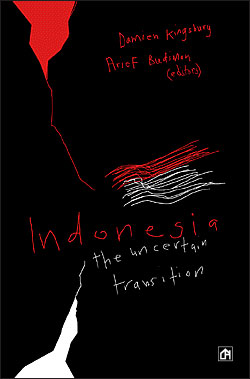Indonesia The Uncertain Transition
In the post-Suharto era, Indonesia is undergoing fundamental change, challenging
how many observers understand the state, its institutions and its people. Indonesia: The Uncertain
Transition seeks to explore this process of change, confronting many of the earlier assumptions
about Indonesian politics and society.
Ranging across subjects as diverse as presidential and Islamic politics, the role of the armed
forces, separatism, the media and civil society, this book examines Indonesia from perspectives that
are freed from the constraints that were imposed under Suharto’s New Order. These perspectives
are brought to bear, often critically, on the process of Indonesia’s transition from an authoritarian
state to a new democracy. As the contributors point out, this process of transition is far from
complete and still faces many difficulties.
The contributors note that the Cabinet of President Abdurrahman Wahid has been divided,
while other institutions including the People’s Representative Council now assert greater political
authority. Even more importantly, the relationship between the central government and the regions
is also undergoing a profound shift, with moves to decentralise political authority and economic
responsibility. This book notes that if such decentralisation is not successfully carried out, the
future of the state itself could be in question.
This book is not only concerned with trying to keep track of changes in Indonesia. It also examines
how observers and critics look at Indonesia, and how their thinking on Indonesia has been forced
into accepting a greater flexibility than in the past. To this end, the contributors were encouraged to
‘rethink’ Indonesia and to reconsider the issues with which they were dealing.
Not only does this book reconsider in a very basic way much of Indonesia, but it also acknowledges
that this whole process of change in Indonesia has been problematic. With such great change in the
offing, with the stakes so high and affecting so many people, the options for change, for the process
of transition, have been deeply contested.
The contributors to this volume are all experienced observers of Indonesia, though their
backgrounds are mixed. Most are academics, from Australia and Indonesia, who bring to their
contributions the interests and rigours of their disciplines. Others are activists or actors in the
political process. The blending of contributors, the editors believe, has made a stronger and more
durable book. The text groups together subjects in their primary areas of focus, each section
with a brief introduction of its own.
Indonesia is at a critical juncture, poised between the end of an era of repression and a future
filled with unknowns and the unknowable. Indonesia and its people have hope and, most often,
a commitment to attempting to build a better future. This book shows how that is being put into
practice, and indicates the chances of success.
|
|

AUTHOR:
(edited by) Damien Kingsbury & Arief Budiman
STATUS:
Back List
PRICE:
$49.95
ILLUSTRATIONS:
n/a
FORMAT:
Portrait; softcover; xiv + 372 pages
DIMENSIONS:
204 x 135 mm
ISBN:
1863332081
|
|

